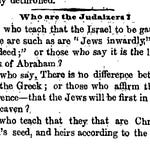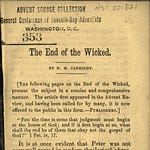The following remarks are from the pen of William Miller. Brother Miller was an advocate of the change of the Sabbath, though he took this for granted without attempting to show any divine precept in its favor. But his views respecting the perpetuity of the Lord's Sabbath and its distinction from the sabbaths of the Jews are none the less correct.
“I say, and I believe I am supported by the Bible, that the moral law was never given to the Jews as a people exclusively, but they were for a season the keepers of it in charge. And through them the law, oracles, and testimony, have been handed down to us: see Paul's clear reasoning in Romans 2, 3, and 4, on that point. Then, says the objector, we are under the same obligation to keep the Sabbaths of weeks, months, and years, that the Jews were. No, sir; you will observe that these were not included in the Decalogue: they were attachments added by reason of transgression, until the seed should come, to whom the promise of one eternal day, or Sabbath of rest, was made. ‘Therefore there remaineth a keeping of a Sabbath to the people of God.’”
“Only one kind of Sabbath was given to Adam, and one only remains for us. See Hosea 2: 11. “I will cause all her mirth to cease, her feast days, her new-moons, and her Sabbaths, and all her solemn feasts.” All the Jewish sabbaths did cease when Christ nailed them to the cross. Colossians 2:14-17. ‘Blotting out the hand-writing of ordinances that was against us, which was contrary to us, and took it out of the way, nailing it to his cross; and having spoiled principalities and powers, he made a show of them openly triumphing over them in it. Let no man, therefore, judge you in meat, or in drink, or in respect of an holy day, or of the new-moon, or of the Sabbath days: which are a shadow of things to come; but the body is of Christ.’”
“These are properly called Jewish Sabbaths. Hosea says, “her sabbaths.” But the Sabbath of which we are speaking God calls “my Sabbath.” Here is a clear distinction between the creation Sabbath and the ceremonial. One is perpetual; the others were mere shadows of good things to come, and are limited in Christ.”—Miller's Life and Views, pages 161, 162.










